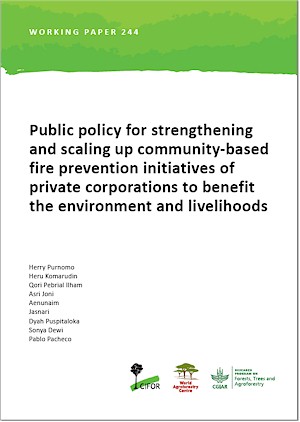| Working Paper Series |
 |
|
| Title | Public policy for strengthening and scaling up community-based fire prevention initiatives of private corporations to benefit the environment and livelihoods | | Author | Herry Purnomo, Heru Komarudin, Qori Pebrial Ilham, Asri Joni, Aenunaim, Jasnari, Dyah Puspitaloka, Sonya Dewi and Pablo Pacheco | | Year | 2018 | | Series Number | Working Paper 244 | | Number of Pages | 76 | | Call Number | WP00250-18 |
|
| Abstract: |
Conceptually, a project or program is scaled up in terms of size or scaled in order to produce and magnify impacts. A scale-up can also be understood as a transition of success from a pilot grassroots project to an operational model at larger scale or where the success of a policy/program/project in different places is gradually enlarged, replicated, adapted and perpetuated to cover larger numbers of beneficiaries. The process may include various dimensions such as social (social inclusiveness), physical (replication), political (policy and budget commitment) or even conceptual (mindset and power relations changes), and it can focus on goals (socioeconomic, human and environmental impacts) and methods (system, policy, process). Scale-ups can take the form of vertical expansion, be institutional in nature and involve a wide range of stakeholders at different levels (functional and political scale-ups). They can also be horizontal (scale-outs, quantitative scale-ups), expanding geographically and involving large groups of communities.
The Integrated Forestry and Farming System (IFFS or Desa Makmur Peduli Api – DMPA) was launched in December 2015 during COP 15 in Paris and is increasingly recognized as an effort from the private sector to prevent fire and improve community livelihoods. Although this program is quite new and still needs to be improved, the scaling up of this program should be considered ahead of time to magnify its impact. The success in the scaling up of any project or program is determined by various factors such as the political will or commitment of the parties involved, enhanced local capacity, supporting policies and financial support. In addition to the full support provided by the partner company, Asia Pulp and Paper (APP), and various supporting policies as described elsewhere in this report, there are ample opportunities for DMPA to be successfully replicated and expanded into wider geographical areas. High-level instructions issued by the President of Indonesia as expressd in nine national priority programs (Nawa Cita), where communities are considered as part of the solution, provide impetus for this kind of program to be expanded. Other corporations such as the Asia Pacific Resources International Holdings Ltd (APRIL) Group, Association of Indonesia Forest Concession Holders (APHI), Musim Mas and Sime Darby have initiated different kinds of fire-free villages programs.
The importance of incorporating community development into program planning and implementation is also highlighted at various levels of governance. As revealed in the testimonies of local people and other parties involved in this program, there is potential for local people to better understand the importance of maintaining the environment and the consequences for failing to do so, and to adapt themselves to the new practices and technologies for opening up land and managing the natural resources surrounding them. There are also indications that people develop their own capacity to improve their livelihoods. Through DMPA, options are being explored to create alternative livelihoods for local people around commodities that were often previously neglected due to the nonexistence of market or technology support. |
|